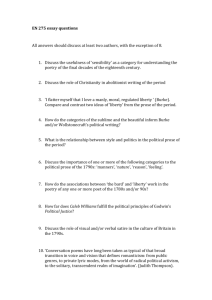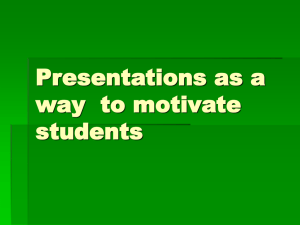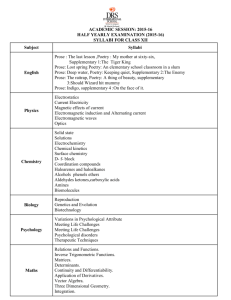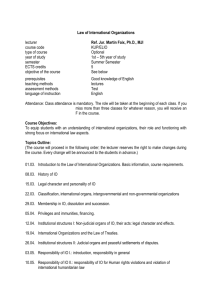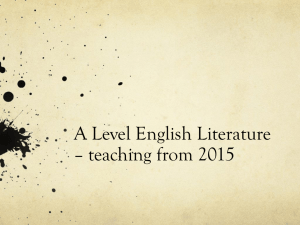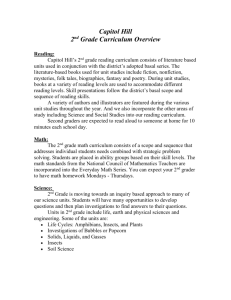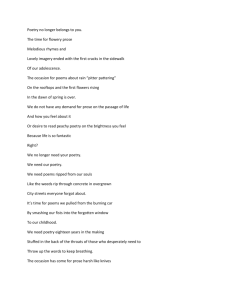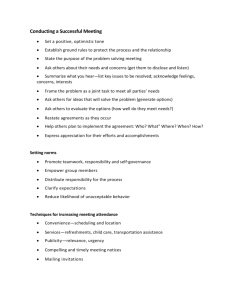GREAT BASIN COLLEGE 1500 College Parkway Elko, NV 89801
advertisement
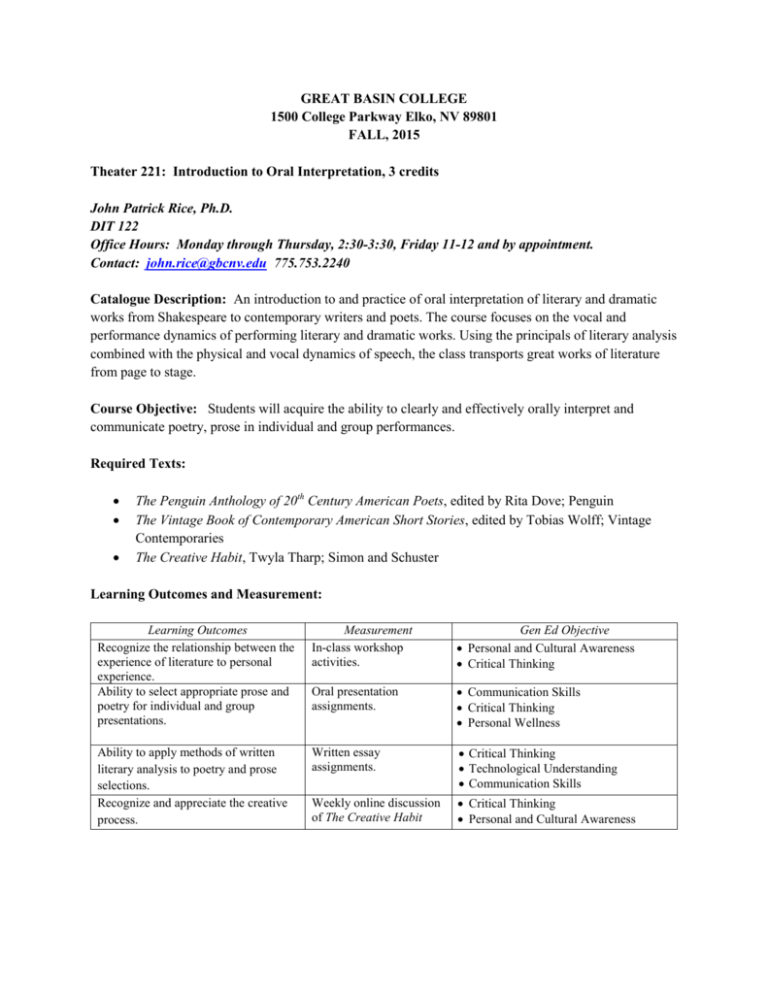
GREAT BASIN COLLEGE 1500 College Parkway Elko, NV 89801 FALL, 2015 Theater 221: Introduction to Oral Interpretation, 3 credits John Patrick Rice, Ph.D. DIT 122 Office Hours: Monday through Thursday, 2:30-3:30, Friday 11-12 and by appointment. Contact: john.rice@gbcnv.edu 775.753.2240 Catalogue Description: An introduction to and practice of oral interpretation of literary and dramatic works from Shakespeare to contemporary writers and poets. The course focuses on the vocal and performance dynamics of performing literary and dramatic works. Using the principals of literary analysis combined with the physical and vocal dynamics of speech, the class transports great works of literature from page to stage. Course Objective: Students will acquire the ability to clearly and effectively orally interpret and communicate poetry, prose in individual and group performances. Required Texts: The Penguin Anthology of 20th Century American Poets, edited by Rita Dove; Penguin The Vintage Book of Contemporary American Short Stories, edited by Tobias Wolff; Vintage Contemporaries The Creative Habit, Twyla Tharp; Simon and Schuster Learning Outcomes and Measurement: Learning Outcomes Recognize the relationship between the experience of literature to personal experience. Ability to select appropriate prose and poetry for individual and group presentations. Measurement In-class workshop activities. Gen Ed Objective Personal and Cultural Awareness Critical Thinking Oral presentation assignments. Communication Skills Critical Thinking Personal Wellness Ability to apply methods of written literary analysis to poetry and prose selections. Recognize and appreciate the creative process. Written essay assignments. Critical Thinking Technological Understanding Communication Skills Weekly online discussion of The Creative Habit Critical Thinking Personal and Cultural Awareness Method of Instruction: The course will be divided into four four-week units. 1. 2. 3. 4. Unit One: Poetry Unit Two: Prose Unit Three: Group Presentations Unit Four: Final Projects Each unit will culminate with a formal presentation by the students. The class is held in a “work-shop” format. That is, much preparation will take place outside of class and students will present their work to small groups and to the class on a weekly basis. Weekly presentations will be an opportunity for coaching and constructive criticism of students’ work by the instructor, fellow students and self-evaluation. Student success is measured by mastery of the elements of the course objectives and learning outcomes. That mastery includes the student’s performance and participation in coaching and constructive criticism of their own work and the work of their classmates. Regular class attendance is required. Course Requirements: Regular, on-time arrival and class participation. Roll will be taken at each class. Any instances where is student cannot or will not be able to participate must be reported to the instructor in a timely way. Four Individual and Group Presentations; one for each unit of the course. 1. Poetry 2. Prose 3. Group Presentations 4. Final Presentation Regular weekly participation in online discussion of readings from The Creative Habit. Written analysis essay assignments. Group analysis presentation. Grading Criteria Student presentations will be graded in accordance to the course objectives and learning outcomes. Generally speaking, student writing and presentation assignments will be graded on: Student’s competence in: Ability to select appropriate, meaningful material. Summarize the selection either in writing or orally. Presentation with an entry-level of competence. Vocal flexibility, including pitch, breath control, volume, enunciation and pacing. Written and oral presentation of literary analysis, including identifying: Allegory Character Connotation Denotation Imagery Grading is based on a percentage of total points possible. 20% - Online Discussion – 200 points 20% - Written essays – 200 points 60% - Presentations – 600 points Grading Scale: A AB+ B BC D F 94-100% 90-93% 87-89% 83-86% 80-82% 70-79% 60-69% Below 60% Point Values: Online discussion: 12.5 points per week Written Essays: 50 points each Presentation 1: 100 points Presentation 2: 150 points Presentation 3: 150 points Presentation 4: 200 points COURSE SCHEDULE (subject to modification) Unit One, POETRY Week One: Introduction to Class Sonnets assigned Reading Assignment, Chapter 1, The Creative Habit Online Discussion of reading. From the PENGUIN ANTHOLOGY, choose seven poems for work. In-class work, coaching and criticism on chosen poetry and sonnet. Week Two: Reading Assignment, Chapter 2, The Creative Habit Online Discussion of reading. In-class work, coaching and constructive criticism on chosen poetry. Week Three: Reading Assignment, Chapter 3, The Creative Habit Online Discussion of reading. Choose two poems along with sonnet for Unit One FINAL PRESENTATION o Writing Assignment: Written justification of choice of poetry. Criteria: Personal Connection Identify Allegory Character Connotation Denotation Imagery Week Four: Reading Assignment: Chapter 4, The Creative Habit Online Discussion of reading. POETRY & SONNET PRESENTATIONS TO CLASS and individual conferences with professor. Unit Two, PROSE Week Five: Reading Assignment, Chapter 5, The Creative Habit Online Discussion of reading. From THE VINTAGE CONTEMPORARY, choose four short stories for work. In-class work, coaching and criticism on chosen prose. Week Six: Reading Assignment, Chapter 6, The Creative Habit Online Discussion of reading. In-class work, coaching and constructive criticism on chosen prose. o Select “cuttings” for presentation. Week Seven: Reading Assignment, Chapter 7, The Creative Habit Online Discussion of reading. Choose TWO pieces of prose for Unit Two FINAL PRESENTATION o Writing Assignment: Written justification of choice of prose. Criteria: Personal Connection Identify Allegory Character Connotation Denotation Imagery Week Eight: Reading Assignment, Chapter 8, The Creative Habit Online discussion of reading. PROSE PRESENTATION to class. Individual conferences with professor. Unit Three, GROUP PRESENTATIONS Week Nine: Reading Assignment, Chapter 9, The Creative Habit Online Discussion of reading. Group Assignments by professor. o Choose eight new poetry selections and four new prose selections for group work. (None of the selections can have been previously used by any member of the group.) In-class work, constructive criticism on group selections. Week Ten: Reading Assignment, Chapter 10, The Creative Habit Online Discussion of reading. In-class work, constructive criticism on group selections. o Select two poems and two pieces of prose for analysis and final presentation. Work on “cuttings” for selections. Week Eleven: Reading Assignment, Chapter 11, The Creative Habit Online Discussion of reading. Writing Assignment: o GROUP ANALYSIS PRESENTATION Each group will prepare and present an oral presentation justifying their selections. Groups are encouraged to use technology (power-points, etc.) in this presentation. Criteria: Personal Connection Identify Allegory Character Connotation Denotation Imagery In-class work, coaching and constructive criticism. Week Twelve: Reading Assignment, Chapter 12, The Creative Habit Online discussion of reading. GROUP PRESENTATIONS to class. Group conferences with professor. Unit Four, FINAL PROJECTS: INDIVIDUAL AND GROUP Week Thirteen Select one or two poems or one or two pieces of prose (for a total of THREE selections) for individual presentation. These pieces may have been used earlier in the semester, or entirely new selections can be made. Students will confer with professor on selections. Select one group piece, either poetry or prose. Students will confer with professor on the makeup of their group and the group selection. Online discussion: Topic TBA Week Fourteen Online discussion: Topic TBA Individual and group work, coaching and constructive criticism on selections. Week Fifteen Online discussion: Topic TBA Writing Assignment: o Written justification for selection of pieces (individual and group) for final project. Criteria: Personal Connection Identify Allegory Character Connotation Denotation Imagery Week Sixteen FINAL PRESENTATIONS General Education Objectives Objective 1: Communication Skills – Strong Communication is very important to this course, which studies and puts into practice oral and written communication skills. Learner Outcomes Recognize the relationship of the experience of literature with personal experience. Select appropriate material for presentations. Apply methods of literary analysis. Measurements In-class workshops and oral presentations. Written essays and oral communications. In-class workshops, written essays and oral presentations. Objective 2: Critical Thinking – Strong The course requires a significant amount of critical analysis of literature and the student’s personal relationship to a particular piece of literature. Learner Outcomes Select appropriate material for presentations. Apply methods of literary analysis. Measurements Written essays and oral communications. In-class workshops, written essays and oral presentations. Objective 3: Personal and Cultural Awareness – Strong The course promotes an understanding of the role of individuals and groups in society through the lens of a variety of literary sources. Additionally, the course requires effective group dynamics in order to accomplish shared objectives. Learner Outcomes Recognize the relationship of the experience of literature to personal experience. Effectively work in a group to achieve a common objective. Measurements Written analytical essays, in-class workshops and oral presentations. Group presentations. Objective 4: Personal Wellness – Moderate The course requires the effective use of the body, including breathing and movement. It requires a moderate amount of physical exertion and a moderate level of fitness. Learner Outcome Use effective relaxation, breathing techniques and movement techniques. Measurement In-class workshops and oral presentations. Objective 5: Technological Understanding – Moderate The course requires competency in operating word processing systems and presentation technologies. Learner Outcome Effective use of word processing systems. Effective use of presentational technologies. Effective use of online learning technology Measurement Written essays. Oral presentations. Weekly discussion posts.
